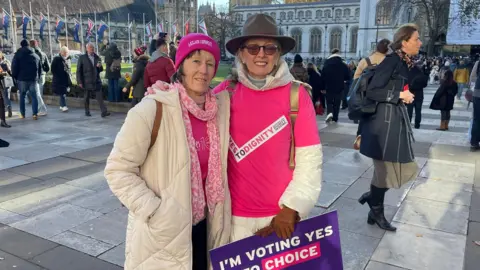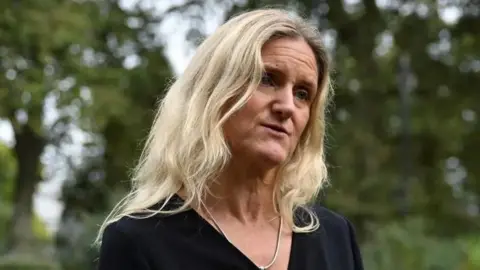Welsh MPs vote as assisted dying bill passes
MPs have voted to allow terminally ill adults to be provided with assistance to end their own life.
The vote does not mean the bill has become law, but allows it to continue for further parliamentary scrutiny with the backing of the elected chamber.
MPs voted 330 to 275 in support of the bill.
Beforehand, it was compared by many to the legalisation of abortion or the abolition of capital punishment.
Vale of Glamorgan Labour MP Kanishka Narayan, who has been in office since July, voted in support of the bill.
Before the vote, he said he was trying to gauge the opinion of his constituents and weigh it up against expert opinion.
Narayan has been attending events with experts, campaign groups, disability rights activists and medical professionals and held a number of listening events.
One constituent, Conway Hawkins from Wick, told Narayan on a virtual meeting he was concerned about a lack of funding for end of life care.
Another, Stephen Blackman from Llansannor, said he wanted to see the bill "go forward", because he understands "it’s the individual that has the final word whether they think it’s time to go or not".

"The bit that reassures me is the narrow focus of the bill in terms of who it applies to," said Narayan.
"The bit that I am still uncertain about has been whether or not our medical professionals are going to be in the position where they can truly assess if someone has given consent without pressure and whether they can truly assess how terminal an illness is."
He had been undecided about how he would vote.
"I think we’ve been reckoning with this question as a society for a long time, so I’m not worried about the timing or the pace of it," he said.
Scores of people joined protests outside Parliament on both sides of the debate on Friday.

Among them were Angela Kilenyi, originally from Caerphilly now living in London, who said she supported the bill.
"I saw my husband die a terrible death and that convinced me even more how important it is to have choice at the end of one's life," she said.
Seb Roach, a student from Cardiff living in London, said he was opposed, describing the bill as "terrifying".
"I'm a Christian myself, I believe everyone has value regardless of disability, age or predicted life expectancy.
"We see time and time again that people live beyond their predicted age of death."
Sandra Holmes, who took her 93-year-old father to die at a Dignitas facility in Switzerland several years ago, said she welcomed the bill being passed.
“You’ve got to have the money to choose to die at the moment, and then you have to go through hell to get out of the country and do it,” she said.
Ms Holmes was threatened with jail after taking her father to Switzerland, but charges were eventually dropped.
She said the bill passing was a “relief” for those who want the right to die.
“And it means that people don’t want the right to die don’t have to use it. It’s choice, which we don’t have at the moment.”

Fellow new MP Llinos Medi, who represents Ynys Môn for Plaid Cymru, had also been undecided, but voted in support of the bill.
"I’ve actually had a personal experience myself with the loss of my father so I’ve always had that in my mind," she said, adding that the views of islanders will be the other influencing factor although she cannot please everyone.
"I’m elected to make those decisions and I have to take that responsibility because I put myself forward for that," she added.
"But it’s making sure that when I go into that position, whatever it may be, that I can justify it to those individuals that aren’t happy.
"This is a massive decision to make and I need to make sure that I can make that decision in full knowledge of the feeling of Ynys Môn."
A key concern for Medi is around mental capacity and a person’s ability to make a choice to end their own life while experiencing terminal illness.
Time pressures on the bill are also unfortunate, she said.
It’s not yet clear if the bill would also require a consent vote in the Senedd.
 Reuters
ReutersSpeaking in the Commons in the debate, Labour Gower MP Tonia Antoniazzi said it was a privilege to be able to vote but "it's not easy".
She supported the bill, but said she supported opposing views.
"Everybody's lives matter and we have to get this legislation right," she said.
She said the Welsh government, which runs the Welsh NHS, would need to be consulted on how it would work in Wales if the proposal did proceed.
Newport West and Islwyn MP Ruth Jones opposed the plans, voting against the bill and argued that you cannot "talk about assisted dying until you've sorted out palliative care.”
"Most of our hospices are charities not funded by the NHS. We have a postcode lottery in terms of end of life care for people, and that's one of the major fundamentals."
What is the proposed law on assisted dying?
Labour MP Kim Leadbeater published proposals earlier this month to make it legal for over-18s who are terminally ill to be given assistance to end their own life.
If the Terminally Ill Adults (End of Life) Bill for England and Wales becomes law, it would give people, in certain circumstances, the right to die at a time of their choosing.
Supporters have said it offers a compassionate option for those enduring terminal illnesses, upholding personal choice and dignity.
Opponents warn that people could be put under pressure to end their lives and have urged the UK government to focus on improving palliative care instead.
If a majority of MPs support the bill on Friday, it will move to the next stage, involving further debates and votes in the House of Commons and Lords in 2025.
The Welsh government said: “We are in regular contact with the UK government regarding the private members assisted dying bill to understand and plan for any implications for Wales.”
